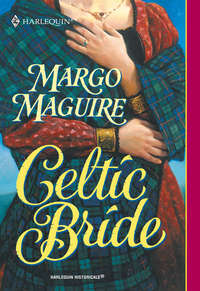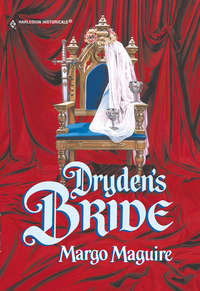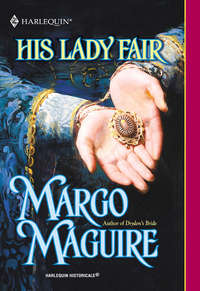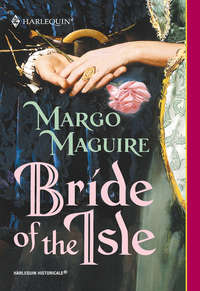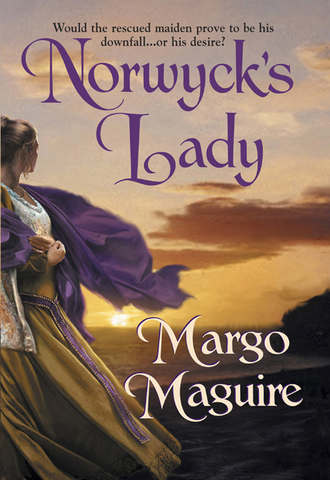
Полная версия
Norwyck's Lady

Norwyck stopped in his tracks and rubbed his eyes to clear them.
A wave of dread overtook him as he looked upon a body lying prone in the sand. Long dark hair cloaked a narrow back, but did naught to hide pale, feminine buttocks.
A woman.
Anger was the first emotion he felt. A woman had been aboard that ship, and Bart’s conflicting emotions warred within him. The knight’s code had been deeply ingrained, so ’twas impossible to look upon her bruised and battered body without pity. No woman should meet such a violent and terrifying end.
Yet he had experienced a woman’s treachery, and he would lay odds that she had somehow been responsible for the shipwreck.
He crouched beside her and touched one shoulder, pushing her over. He did not know what he expected, but it was certainly not to cause a paroxysm of retching and coughing.
God’s blood, she was alive!
Praise for Margo Maguire’s latest titles
Celtic Bride
“A medieval lover’s delight!”
—Rendezvous
Dryden’s Bride
“Exquisitely detailed…an entrancing tale that will
enchant and envelop you as love conquers all.”
—Rendezvous
The Bride of Windermere
“Packed with action…fast, humorous, and familiar…
THE BRIDE OF WINDERMERE
will fit into your weekend just right.”
—Romantic Times
#635 BOUNTY HUNTER’S BRIDE
Carol Finch
#636 BADLANDS HEART
Ruth Langan
#638 LORD SEBASTIAN’S WIFE
Katy Cooper
Norwyck’s Lady
Margo Maguire

Available from Harlequin Historicals and
MARGO MAGUIRE
The Bride of Windermere #453
Dryden’s Bride #529
Celtic Bride #572
His Lady Fair #596
Bride of the Isle #609
Norwyck’s Lady #637
This book is dedicated to Julia, Joe and Mike.
No mother could be more proud.
Contents
Chapter One
Chapter Two
Chapter Three
Chapter Four
Chapter Five
Chapter Six
Chapter Seven
Chapter Eight
Chapter Nine
Chapter Ten
Chapter Eleven
Chapter Twelve
Chapter Thirteen
Chapter Fourteen
Chapter Fifteen
Chapter Sixteen
Chapter Seventeen
Chapter Eighteen
Chapter Nineteen
Chapter Twenty
Chapter Twenty-One
Chapter Twenty-Two
Chapter Twenty-Three
Chapter Twenty-Four
Chapter Twenty-Five
Chapter One
The north coast of Northumberland
Late autumn, 1300
The air was still, but the North Sea surf crashed violently upon the beach, as a result of the morning’s terrible storm. Dark clouds hovered over the northern cliffs and over Norwyck Keep, threatening another burst of rain.
Bartholomew Holton, Earl of Norwyck, stalked up the beach, oblivious to the weather. His tall, powerful form was garbed in his usual dark tunic and hose, though he’d worn a cloak in deference to the harsh weather.
He cared not for clothing, or fashion, especially not now, while circumstances at Norwyck weighed so heavily upon him. His elder brother William’s untimely death had made Bartholomew earl. His new responsibilities disconcerted him, and his wife’s treachery and subsequent death preyed upon his heart and mind.
Felicia Holton had done the unthinkable. She had betrayed Bartholomew’s elder brother, delivering him to their Scottish neighbors to the north, the brutal and barbaric Armstrongs.
’Twas nearly a year now since William, Earl of Norwyck, had died at the hand of Lachann Armstrong, and Felicia herself had lost her own life soon thereafter in childbed, bearing an Armstrong bastard.
Bartholomew continued down the beach, brooding, heedless of Norwyck’s massive walls looming above the shore. He sorely missed his brother. He had never dreamed of being lord of this place, for Norwyck had always been Will’s legacy. William, lighthearted and fair, who seemed always to know what was expected, how to handle every situation. He’d had the respect of every Norwyck knight, including their father’s old adviser, Sir Walter.
Upon his return from the wars in Scotland, Bartholomew’s only wish was to retire to the demesne granted him by King Edward, enriched by the lands that were part of Felicia’s dowry. All he’d been able to think of was the life he’d have with his sweet Felicia, and the children that would soon follow.
Aye, Felicia. His lying, murderous, whoring wife.
Bart kicked at a piece of flotsam that had washed ashore. ’Twas dark wood, and had once been highly polished, but Bartholomew paid it no mind as he scowled and continued down the beach, stepping around other bits of debris that had washed up in the storm.
A sudden wind whipped at his cloak and he grasped the edges in annoyance. Sand filtered into his shoes, but he took no notice. He hunched his shoulders against the wind and walked on.
Eight months since Felicia’s death. It had been eight months since he’d learned of her treachery, her betrayal. And still Bartholomew did not know how she’d managed to lure William into Lachann Armstrong’s trap. Or why.
True enough, Bart had hardly known Felicia when their betrothal contract and marriage had taken place. She’d been a lass of seventeen; he had barely reached manhood. They’d been married a mere six months when Bart had gone off to Scotland with King Edward’s archers and his mighty cavalry.
And for two long years, he’d been away from home.
Bart had been foolish enough to hope his wife had been with child when he left. But that had not been the case. Still, ’twas no matter. They had many years in which to raise a family, and upon his return from Scotland, Bart threw himself into the task of wooing his wife. This was no hardship, for Felicia was beautiful and accomplished. Within weeks, she was pregnant.
Little did Bart know that the bairn had been planted in his absence. The boy-child, born only six months after his return, gave proof to Felicia’s lie. Her hateful words during the throes of her labor only verified it.
The broad expanse of beach that ran adjacent to Norwyck Castle began to narrow as Bart walked north, and he was soon forced to walk among large boulders and shallow tide pools, with thick reeds and grassy growth sprouting from the wet sand.
More debris was here, too, and it finally caught Bartholomew’s attention. Among the flotsam were several odd items—table legs, a sealed chest with brass handles, two wooden spoons, a sealed barrel.
Awareness struck and Bart stopped in his tracks to gaze out at the roiling sea. A ship must have sunk in the storm. ’Twas quite common for ships to have difficulty navigating these waters, yet only one vessel had ever gone down here in all of Bartholomew’s twenty-eight years.
He’d been a raw youth, not yet in his teens, when he’d walked this beach with his father and William, looking for survivors.
There had not been any. They’d found plenty of bodies, but no one had managed to get to shore alive. He assumed this wreck would be just as bad.
Bart almost welcomed this turn of events, for it took his mind off the dark and dismal thoughts that preoccupied too many of his waking hours. He began walking again, and discovered the first body, that of a man whose clothes—what were left of them—were in tatters.
Bart rolled him over and verified that he was dead, then quickly moved on, looking for survivors.
The speed of the wind increased, and the waves crashed ever more violently upon the shore, but Bartholomew continued along the beach, caught up in the macabre scene splayed out before him. More debris and bodies were caught behind rocks and trapped among the weeds.
Not one victim was alive.
Still Bart walked, in spite of the storm that was moving in. He turned over bodies and stepped past the shattered fragments of the lives that had been lost. When he returned to the keep, he would send a contingent of men to recover the corpses and bury them. He would direct the priest to—
He stopped in his tracks and rubbed his eyes to clear them. A wave of dread overtook him as he looked upon a body lying prone in the sand. Long, dark hair cloaked a narrow back, but did naught to hide pale, feminine buttocks.
A woman.
Anger was the first emotion he felt. A woman had been aboard that ship, and Bart’s conflicting emotions warred within him. The knight’s code had been deeply ingrained, so ’twas impossible to look upon her bruised and battered body without pity. No woman should meet such a violent and terrifying end.
Yet he had experienced a woman’s treachery, causing him to hold naught but harsh and bitter feelings toward the weaker sex. In truth, Bart would lay odds that she had somehow been responsible for the shipwreck.
Approaching her warily, he barely noticed her feminine form—the tapered waist that flared to smooth, full buttocks, the long, shapely legs and delicate feet. He saw only the ugly bruises and nasty scrapes that marred otherwise perfect skin.
He crouched beside her and touched one shoulder, pushing her over. He did not know what he expected, but it was certainly not to cause a paroxysm of retching and coughing.
God’s blood, she was alive!
Bart positioned her so that she could cough the water out of her lungs, but she remained limp and unconscious. When she fell back into his arms, he pulled the tattered remains of her clothes from her body and somehow managed to cover her with his cloak.
He glanced around. More bodies were out there, and the storm was closing in. If the woman were to have any chance of survival, he had to get her to shelter quickly. And the only shelter to be had was at Norwyck Castle.
He lifted the woman into his arms. She was naught but deadweight, wrapped in his damp woolen cloak. But Bartholomew had a swordsman’s powerful build, and the legs of a horseman. ’Twas no difficulty to carry her. He shifted in order to get a firm hold on her, then started back down the beach toward the path that led to one of the castle gates.
Servants and children were in the great hall when Bartholomew kicked open the heavy oak door and strode in carrying the woman. There was silence for a split second, then everyone began chattering at once, all asking questions simultaneously.
“What’s happened?”
“Who are you carrying?”
“Is she dead?”
“Can we see?”
He went to the table and, using one foot, yanked a chair far enough away to give him room to sit down with his burden still in his arms.
“Hush, all of you,” he said. He was not only the new earl, but the elder brother and sole guardian of his four younger siblings. They were half siblings, actually, for his own mother had died when he was just a lad. His father had remarried and had a second family.
The twins, Henry and John, were fourteen years old. Then came Kathryn, who was eleven, but thought she was the lady of the hall. Eleanor was last, a mere six years, as inquisitive and mischievous as two children her age.
“There’s been a shipwreck,” he said, leaning back, resting his arms. “This is the only survivor that I found.”
Everyone began talking again, and Bart gestured for one of the footmen. “Send a maid to see that a chamber is made ready for her, Rob,” he said. “Then get some men and go down to the beach before the storm rolls in, and see if there are any more survivors.”
“Yes, my lord,” the man said.
“Listen, all of you,” Bart said, turning his attention back to his siblings. “I don’t know anything about the shipwreck, only that there is debris all over the beach, as well as several bodies.”
“Are you sure this one’s alive?” Henry asked, giving Bartholomew’s burden a sidelong glance.
“Will we keep her?”
Bart looked down at the inert body in his arms. Her head lolled against his upper arm, extending her neck. A pulse beat there—too fast, but it seemed steady enough.
“Yes, she’s alive, and no, we will not keep her, Eleanor,” he said to his wide-eyed sister. “If she survives, we’ll send her on her way.”
He wondered where the woman had been bound when her ship sank. She could have been headed for Scotland, or on a southbound ship that had been blown off course. There was no way of knowing, of course, until she regained consciousness.
“She’s beautiful,” Eleanor said with awe.
“You won’t be falling in love with her as you did Felicia, will you?” Kathryn demanded, with arms crossed over her bony chest. She was a delicate child whose world had been shaken by William’s and Felicia’s deaths.
Bart scowled and let out a puff of air in derision, dismissing his sisters’ words. He hadn’t the slightest interest in the woman’s appearance, nor would he fall in love with her. Not in this century at least. He was through with women.
The earldom would pass to Henry, the elder of the twins, and through him, to his sons.
Refusing to look too closely at the woman in his arms, Bart stood abruptly and made his way toward the main staircase, with his sisters and brothers following. He reached the first landing as two maids stepped out of the stairwell leading to the east tower.
“The tower room is ready, my lord,” one said.
“Naught else would do, my lord,” said the other, a widow named Rose, whom Bart remembered for her patience with his sisters. “The lower chambers are not yet fit for more guests.”
The bishop of Alnwick and his large entourage had just left Norwyck, and the usual guest chambers were not ready for further use.
Bartholomew said not a word, but followed Rose, whose candle lit the way up a circular stone staircase to the most beautiful chamber in the keep. ’Twas the place most favored by Bart’s stepmother, a circular room with four tall, peaked windows, one facing each direction. The children liked coming up here, so the maids always kept it fresh.
When Bart entered, he saw that a basin of clean water had been placed upon the stand near the bed. The bed curtains were pushed aside and the blankets pulled down. A long linen sheet lay on top, presumably to be discarded once his filthy cloak was removed from the woman’s body. Then she would be naked again.
He gritted his teeth and turned to his siblings. “Everyone out. Now.”
They protested, but did his bidding anyway, grumbling as they closed the chamber door behind them. Bart set his burden carefully down on the bed. He should have had Rose stay to help him, but neglected to call her back when she quit the room with his siblings.
He picked up one of the candles and lit a lamp near the bed. Then he turned to look at this woman survivor.
Her hair was nearly dry now, a matted and snarled mass of a lighter brown than it had seemed before. As he pushed it away from her face, his mouth went dry.
Dark eyelashes formed thick crescents over high cheekbones. Her nose was straight and her mouth wide, with full lips slightly parted. Her neatly dimpled chin came to a delicate point over the elegant lines of her neck. Her skin was perfection, smooth and fine.
She winced and made a small noise, then moved one hand fitfully. Unable to keep himself from touching her again, he smoothed the hair away from her forehead and saw that a large purple lump had formed at the side, with a deep, bloody gash cut through it.
’Twas no wonder she was unconscious. The blow that had caused this wound had to have been monstrous. He dipped a clean cloth in the basin of water and began to cleanse the cut, stroking gently, mindful that the slightest touch would cause her pain.
She moaned and turned away, though she remained unconscious. Bart continued washing. He believed the gash should be stitched, but he could not help but think of the terrible scar that would result. The wound was closed and dry for now. Mayhap if she remained quiet, it could be left alone.
Bart hesitated to open the cloak that covered her, having already glimpsed what lay beneath. He was not about to subject himself to the kind of reaction the sight of her naked body would bring. Yet he did not want her exposed to anyone else—not even Rose.
The woman began to tremble, and Bart cursed. He had no choice but to get her out of that cloak and under the blankets. He had to warm her.
Delaying the inevitable, he stepped away from the bed and lit the fire that had been laid, fanning it until it flamed cozily, throwing its warmth into the room. Briefly, Bartholomew considered calling Rose back to deal with the woman, but dismissed the idea once again, refusing to consider his reasons too carefully. Cracking his knuckles, he turned back to her.
The cloak had stiffened in the salty mist, but he managed to peel it away, leaving part of it underneath her. She had scrapes and bruises all over. Using a cloth to brush the dried sand from her flesh, Bart forced himself to ignore the lush fullness of her body as he touched her.
She continued to tremble, so he worked quickly. She moaned again and tried to shift away from Bartholomew’s touch, but was too weak to manage it. He finally turned her to her side, folded the sand-filled cloak and sheet under her, then lay her on her back again and pulled it out the other side.
He covered her with the bedclothes just as a tap sounded upon the door. Tearing his gaze away from the unconscious woman, Bart went to answer it.
“Bartie?” Eleanor said as she stepped into the room. “Is the lady going to be all right?”
Bartholomew couldn’t help but ruffle his little sister’s bright red hair. She was the only one who could get away with calling him “Bartie.”
“I don’t know, Ellie,” he said, following her to the woman’s bed. “She’s badly hurt.”
Eleanor touched the woman’s hair. She frowned and pulled her lower lip between her teeth. “Will she die up here in Mama’s tower?” she asked, looking up at her elder brother.
Bart clenched his jaw. He hadn’t given that possibility a thought, never considering how it would affect his brothers and sisters. “Nay, little goose,” he said. “She’ll not die in Norwyck Keep if I have aught to say about it.”
Eleanor looked back at the lady. Her gaze was thoughtful, wistful. “She is very pretty,” the child said. “Will she wake up soon?”
“Ellie, I have no more answers for you,” he said as he raked the fingers of one hand through his hair. He’d seen men injured like this during the campaign in Scotland. Some of them never awakened at all, and the thought of this lady’s certain death did not settle well with him. “Run along and find Sir Walter for me. Have him send for the healer in the village.”
“She’s starting to move a bit more,” Alice Hoget said, placing a cool poultice on the survivor woman’s head. Night had fallen, and a terrible storm with it, yet the victim remained unconscious. How long could this go on? How long would it be necessary for her to remain at Norwyck?
“What do you think?” Bartholomew asked. An odd restlessness possessed him. He paced the length of the room while Alice examined the woman and did what she could, which was frighteningly little.
“What I think is that she took a blow to the head and was thrown overboard,” Alice said in her frank manner. “’Tis a wonder she made it to the beach alive. She’s lucky she didn’t drown.”
Bartholomew scowled and resumed his pacing. ’Twould have been better if he’d let her die out there on the beach. Less trouble for him. And no doubt less trouble for the woman whose wounds would likely kill her, anyway.
Yet he hadn’t been able to abandon her to the elements. Even though he no longer had any fondness for women, the thought of leaving her on the beach had never even crossed his mind.
“What I mean is—will she recover?”
“No bones broke, only a rap on the head.” The old healer picked up the lamp, then lifted the unconscious woman’s eyelids. “Look,” she said. “The blacks of her eyes shrink with the light. It means she’ll be coming out of it soon.”
“How do you know that?” Bartholomew asked.
“Experience,” she replied as she gathered her things together. “Seen plenty of people knocked senseless. ’Tis not unusual for a body to remain in this state for a day or more.”
“You mean she could stay this way for more than a day?”
“Aye, m’lord,” Alice said. “Though this one’s showing signs of coming ’round.”
Bart scowled at Alice, then turned his sour expression on the woman in the bed. Alice ignored him as she collected her things and shuffled out of the chamber, leaving Bartholomew alone with the stranger…and his dismal thoughts.
He ceased his pacing and sat on a chair near the bed. The sooner the woman came to her senses, the better, he thought. Then he would send her on her way to wherever she’d been going when her ship had gone down. Likely she’d been en route to one of the southern harbors, but had been blown off course by the storm. That very thing had often been known to happen, though the ships did not usually sink.
Bart picked up one of her hands. The nails were nicely shaped, and the skin was soft. This woman could be naught but a lady with hands like these. Her face was finely shaped, too, and Bart was certain that someone would soon come looking for her.
The sudden, distant clanging of the church bell had him on his feet in an instant. ’Twas not time for services, and there was only one other reason for the bell to ring: the village was under attack.
Without another glance at the unconscious woman, Bart left the chamber and fairly flew down the steps. On the first landing, he met a footman who’d been sent to summon him.
“My lord, Armstrong men are raiding the village!”
“Go out to the stable and see that my squire has my armor and horse ready,” Bart said as they quickly descended to the main hall together. “I’ll be there directly.”
Eleanor sat tearfully at the great table in the hall, with John’s arm around her. Kathryn stood stoically near the fireplace. Henry, thrusting his chest out, approached Bartholomew as he crossed the hall. “I’m coming with you,” he said.
“Nay,” Bart replied. His brothers should have been sent out to foster at a neighboring estate, but circumstances in recent years had prevented it. Therefore, their training was lacking. He would not send the boys out to battle until they were ready. “Stay here and defend the keep and your sisters. The servants will look to you for direction.”
“But, Bart—”
“That is my final word, Hal,” he said, as he crossed the great hall toward the main door. He stopped short when he reached it, and turned back to his younger brother. “I intend to bring back the head of Lachann Armstrong. Make sure there’s a stout pike in the courtyard to put it on.”
Chapter Two
Lightning slashed across the sky and thunder crashed all ’round them. Only the whoreson Armstrongs would mount an attack in this kind of weather. They’d managed to torch a few cottages and rout half a herd of cattle into the hills before Bartholomew and his knights met the attack, with a ferocity that quickly had the Armstrongs retreating to their own land.
Trudging through a heavy downpour, Bart’s men chased the Scots across hills and muddy dales, but the cowardly Armstrongs managed to melt away into their hidey-holes. Bart had had enough of battles to last a lifetime, and he wished the Armstrong would desist with his warring ways.


